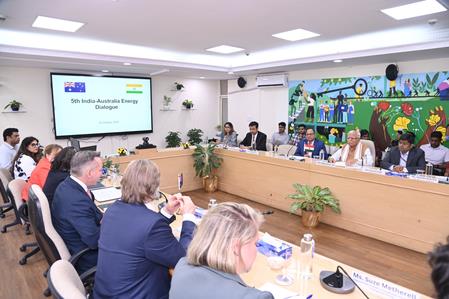
India, Australia Strengthen Energy Ties In Fight Against Climate Change
Discussions on the issue were held at the fifth meeting of the India-Australia Energy Dialogue held here, co-chaired by Power Minister Manohar Lal and Chris Bowen, Australia's Minister for Climate Change and Energy.
The dialogue covered aspects of global transition to net zero emissions, practical cooperation and promoting dialogue in the field of energy efficiency and enabling technologies, recognising the role of green hydrogen, reaffirming commitment to being reliable and trusted trading partners for energy resources, and recognising the importance of diversified, secure, and resilient supply chains, according to an official statement.
The ministers also underlined that the India-Australia partnership continues to play a pivotal role in advancing secure, robust, and sustainable energy systems in the Indo-Pacific region.
The Indian delegation, comprised officials from the Ministry of Power, Ministry of New and Renewable Energy, Ministry of Petroleum and Natural Gas, Ministry of Mines and Ministry of Coal, made detailed presentations on the progress achieved and future cooperation pathways under their respective Joint Working Groups.
Meanwhile, with the steadily increasing share of renewable energy in India's national grid and promotion of clean and efficient energy technologies, there has been significant decrease of about 7 per cent (from 0.78 kg/KWh in 2014-15 to 0.72 Kg/KWh) in average carbon emission intensity of grid electricity in the country, according to figures tabled in Parliament in August this year.
Minister of State for Power, Shripad Naik, stated that India has already achieved the target of 50 per cent of its installed electricity generation capacity from renewable energy this year which was fixed for 20230.
“In its updated Nationally Determined Contribution (NDC) submitted to the United Nations Framework Convention on Climate Change (UNFCCC) in August 2022, India has targeted to achieve about 50 per cent of its cumulative electric power installed capacity from non-fossil fuel-based energy resources by 2030. As on July 31, 2025 the share of non-fossil fuel based installed capacity has become 50.25 per cent of total installed generation capacity,” the minister said in a written reply to a question in the Lok Sabha.
India remains firmly committed to combating climate change while simultaneously ensuring energy security, affordability and accessibility as critical inalienable priorities to ensure growth and development alongside the energy transition of the economy towards achieving 'Net-Zero' emissions by 2070, he added.

Legal Disclaimer:
MENAFN provides the
information “as is” without warranty of any kind. We do not accept
any responsibility or liability for the accuracy, content, images,
videos, licenses, completeness, legality, or reliability of the information
contained in this article. If you have any complaints or copyright
issues related to this article, kindly contact the provider above.
Most popular stories
Market Research
- Thinkmarkets Adds Synthetic Indices To Its Product Offering
- Ethereum Startup Agoralend Opens Fresh Fundraise After Oversubscribed $300,000 Round.
- KOR Closes Series B Funding To Accelerate Global Growth
- Wise Wolves Corporation Launches Unified Brand To Power The Next Era Of Cross-Border Finance
- Lombard And Story Partner To Revolutionize Creator Economy Via Bitcoin-Backed Infrastructure
- FBS AI Assistant Helps Traders Skip Market Noise And Focus On Strategy




















Comments
No comment